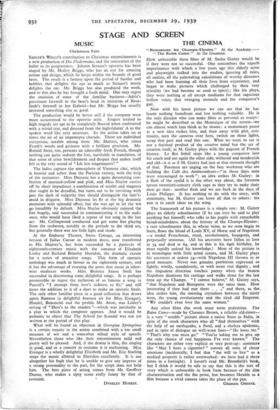THE CINEMA •
Remontons les Champs-Elysees." At the Academy.- " The Rains Came." At the Gaumont.
How unbearable these films of M. Sacha Guitry would be if they were not so successful. One remembers the superb impertinence with which a few years ago this elderly actor and playwright stalked into the studios, ignoring all rules, all unities, all the painstaking calculations of worthy directors who had been learning all their lives from experience, and began to make pictures which challenged by their very triviality (we had become so used to epics) ; like his plays, they were nothing at all except mediums for that sagacious hollow voice, that swinging monocle and the conqueror's gait.
Now with his latest picture we can see that he has learnt nothing humdrum and lost nothing valuable. He is the only director who can make films as personal as essays he might be described as the Montaigne of the screen—we can almost watch him think as he shoots : a momentary pause as a new idea strikes him, and then away with plot, con- tinuity, turn the cameras over here, switch on those lights, scrap that part and read this one. What we seem to see is not a finished product of the creative mind but the act of creation itself, as M. Guitry plays with the pageant of French history. Le Roi Soleil steps like a young conqueror into his coach and out again the other side, withered and monkeyish and old—it is as if M. Guitry had just at that moment thought of that. Foremen are urging on the lazy workmen who are building the Café des Ambassadeurs—" in those days men were encouraged to work ": an idea strikes M. Guitry: in a flash of the eyelid it is the other way about, the foremen sprout twentieth-century cloth caps as they try to make their men go slow: another flash and we are back in the days of Louis Philippe. It has nothing to do with the story, with continuity, but M. Guitry can leave all that to others : his aim is to catch ideas on the wing.
The framework of his picture is a simple one : M. Guitry plays an elderly schoolmaster (if he can ever be said to play anything but himself) who talks to his pupils with remarkable broad-mindedness about the history of the Champs-Elysees : a rare schoolmaster this, in whose veins, as we soon begin to learn, flows the blood of Louis XV, of Marat and of Napoleon —a model Frenchman, royal, revolutionary, bourgeois, and perpetually amorous. (All his ancestors have fallen in love at 54 and died at 64, and as this is his 64th birthday, he must rapidly unload his knowledge.) Most of the picture is in monologue with little acted scenes, and M. Guitry plays his ancestors at ardent 54—with Napoleon III thrown in as good measure. Never was genuine patriotism expressed so lightly, wittily, scandalously, or with more real dignity ; and the impudent direction touches poetry when the beaten Napoleon dismisses his carriage and walks alone for the last time up the Champs. " I cannot believe," M. Guitry
" that Napoleon and Bonaparte were the same man. How interesting if they had met there . . .," and there, as the idea strikes him, the meeting crystalises between the misty trees, the young revolutionary and the tired old Emperor. " We couldn't even love the same woman."
Any other films this week must seem pedestrian. The Rains Came—made by Clarence Brown, a reliable old-timer— is a very " seeable " picture about a 'native State in India, in spite of the stock characters who all " find themselves " with the help of an earthquake, a flood, and a cholera epidemic, and in spite of dialogue on well-worn lines—" He loves me." " That's why you must go." " You're asking me to give up the only chance of real happiness I've ever known." The characters are either very explicit or very pent-up: sentences like " May I have a cigarette? " convey all sorts of classy emotions (incidentally, I feel that " the will to live " as a medical property is rather overworked: we have had it three times in a fortnight). I haven't read Mr. Bromfield's book, but I think it would be safe to say that this is the sort of story which is unbearable in book form because of the dim characterisation and the flat prose, but becomes likeable as a film because a vivid camera takes the place of the pen.
GnAnaht GREENE.






























 Previous page
Previous page